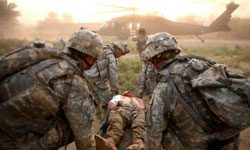Hekmatyar: Judicial Immunity to US Soldiers Prolongs War in Afghanistan

 Leader of Hezb-i-Islami Afghanistan (HIA) Gulbadin Hekmatyar described complete withdrawal of the foreign forces as his party’s precondition for attending the next presidential election, and said if Kabul gives judicial immunity to the US forces, war will continue in Afghanistan.
Leader of Hezb-i-Islami Afghanistan (HIA) Gulbadin Hekmatyar described complete withdrawal of the foreign forces as his party’s precondition for attending the next presidential election, and said if Kabul gives judicial immunity to the US forces, war will continue in Afghanistan.
“If the foreign military forces withdraw from Afghanistan and a transparent and fair election is held, the Hezb-i-Islami will participate in the upcoming presidential election,” Hekmatyar said in an interview with Kabulnews private tv channel on Sunday.
He, meantime, said that if Kabul and Washington sign a security pact which gives judicial immunity to the US forces in Afghanistan, his party will be left with no other way but continued resistance and war.
The US-led war in Afghanistan began in October 2001. The offensive removed the Taliban from power, but insecurity continues to rise across the country, despite the presence of thousands of US-led troops.
Iranian officials have frequently lashed out at the US and NATO forces for occupation of Afghanistan for more than a decade under the pretext of war on terror.
Tehran stresses that the responsibility for the establishment of security and stability in Afghanistan should be in hands of the country’s government and security forces, but not foreigners.
Afghanistan has long been a focus of imperial rivalry and scene of foreign intervention, most recently since the 2001 US-led invasion but also in the 1980s uprising against Russian troops that ultimately helped bring down the Soviet Union.
Washington denies it is seeking to establish permanent military bases in Afghanistan, but American military sources say they envisage around 15,000 forces remaining in Afghanistan after the 2014 withdrawal.







